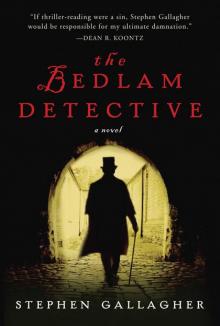- Home
- Stephen Gallagher
The Boat House Page 22
The Boat House Read online
Page 22
"I'd just like to get a look at him. Is he still in the area?"
"I wouldn't know. He was working up at that new ski centre, but I haven't seen him in a while. What is it, Ross?"
Aldridge hesitated for a moment, as if this was one of those newly shaped thoughts that had never before been put into words. Then he said, "Probably nothing. It's just that there have been too many coincidences around here of late, and I'm not happy. This is the fifth 'accident' in the past three months, even if you don't count Ted Hammond's boy and his girlfriend. We average maybe one serious incident a year around here, and the season isn't halfway over yet. Back on my desk I've got seven missing persons reports, just general sheets from other regions on kids who set out hitching and were maybe heading this way. That's apart from dead stags and dead dogs and who knows what. It's too many."
"What are you saying?" Angelica asked, and Aldridge made a who knows? gesture as if he'd already said more than he'd planned.
"Nothing," he said. "I don't know. But there's a classic picture for a situation like this, and I'm looking for someone who fits it. Someone who lives on his own, so nobody knows too much about him. Friendly on the surface, but he mainly likes his own company. And he didn't get here until sometime after the beginning of the year."
Next door in the kitchen, the warning signal on the water heater began to sound. Someone switched it off.
"Oh, no, Ross," Angelica said, disbelievingly. "Not Tom."
But Aldridge was already getting to his feet, and he held up a calming hand.
"Look," he said, "nothing about this to anybody. It's just a stupid idea of mine, and I want to be the one to knock it on the head before it goes any further. There's no theory or anything, it's just… too many accidents."
So, feeling strangely like some kind of a Judas even though she knew that Tom Amis couldn't have been involved, she told him how to find the old hunting lodge up on the treeline that, after a few false starts in the past three or four years, was undergoing final conversion to become the new High Rigg ski centre. It wasn't a place that Aldridge had known much about, although this was bound to change when the next winter season arrived. This is simply a matter of elimination, Angelica told herself; a helping hand toward proof of innocence, rather than a betrayal.
"Thanks," Aldridge told her as he made for the door. "I've got a few calls to make about the wreck, and then I'll go up and see him. Not a word to anyone."
And then he left.
Angelica stood at the main door, watching through the lace curtained glass as his car made a turn in the square. Now she was thinking, what did she really know about Tom Amis anyway? And she was so intrigued by this new light on an untested idea that she didn't even notice Alina's emergence from the kitchen until the waitress was standing alongside her.
"Miss Venetz?" she said.
Angelica looked at her, a little dazed as if she'd just been jogged out of a waking dream.
Alina went on, "I wonder if I can take the afternoon off. I'm not feeling so well."
"Of course," Angelica said. "Sonia can cover." She looked out again through the glass.
"And may I borrow the van to get me home," Alina added, "if you weren't planning to use it? I can bring it back in the morning. I wouldn't ask, but I don't quite feel up to the walk."
"I'll drive you," Angelica said, beginning to tear herself away, but Alina didn't seem to want to cause so much disruption.
"I can drive," she said. "Please, I'd rather."
It didn't even occur to Angelica, at least not straight away, that an illegal immigrant with no valid license probably wasn't the best insurance risk in the event of any accident; almost absently she went back to the office and opened a drawer to let Alina have the van keys, and then she returned to one of the windows overlooking the square. It was almost as if the life going on outside had taken on an entirely new and fascinating aspect for her.
Tom Amis? she was thinking, almost entranced.
And she was still thinking it a few minutes later when their small Renault van went by, with Alina at the wheel.
THIRTY-SEVEN
Pete had been back at the yard for little more than half an hour and was making himself useful by restocking the Coke machine on the marina wharf when he saw Diane again; he quickly threw the cans in wherever they'd fit, Coke in the Fanta line and Fanta in the Seven Up, and then he closed up the front of the machine and went to meet her.
"Busy day?" she said, looking him over. Getting the burned-out car up onto the hoist in a way that satisfied the police lab officials had been a messy, complicated job. He'd tidied himself up on his return but there hadn't been time for him to run home and change; he'd considered it, but he hadn't wanted to risk missing her.
"Busy enough," he said. "How about you?"
"You're going to hear all about it," she said. "Can we go somewhere and talk?"
Pete glanced across the yard. "How about in the house? Ted won't mind."
"That could be a problem. I don't want Ted or anybody else to hear this."
So Pete looked around; a big Birchwood and a smaller Chris Craft stood empty at a couple of the nearer jetties, but they were sales stock it wouldn't look good if the yard staff were to be seen using them like a rest area.
"Let's take one of the cars, then," he said.
And Diane quickly said, "Let's make it mine."
They walked through the main part of the yard, Pete leaving the Coke machine keys with one of the Wilson boys and looking in to say a quick goodbye to Ted and to Frank Lowry on the way out. But Lowry had already gone home and Ted was on the phone in his office, having trouble getting himself out of a none-too-fascinating business conversation with somebody called Ellis. With the phone still to his ear Ted leaned out to look past Pete and then, having seen Diane just outside the doorway, he caught Pete's eye again and pointed to an envelope that was just out of reach in his OUT tray. Pete saw that it had Diane's name on it, and he took it outside to her.
She opened it as they walked toward the Toyota. It contained the key to the boat house, and nothing else.
"I didn't know what to say about this," she said, looking at it bleakly.
"It's only a key," Pete said.
Diane looked at it a moment longer.
"Is it?" she said, and then she slipped it, envelope and all, into one of the pockets of her jacket.
"You can get right in, the car isn't locked," she said.
Ross Aldridge was going to be home late again.
He could avoid it by leaving this conversation with Tom Amis for another day, and he was tempted to do exactly that… but the professional side of his nature told him that he ought to know better and, besides, for some time now Loren had been in the kind of mood where nothing seemed to suit her no matter what he did. Whether he came home early, or came home late; whether they went out, or stayed in and sat around. The company of a total stranger would have been better than this; a stranger would feel an obligation to be civil, at least. Loren was rarely straight out rude, but she no longer seemed to be able to answer a simple question without throwing in a dash of attitude. He didn't know what he could do about it. He wasn't a saint, he couldn't go on like this forever; for the first two years after the stillbirth he'd felt as if he was carrying her across a tightrope while she bit and clawed at him every step of the way. They'd come through that, but not to return to the relationship they'd once had. Everything was different. She was different. Sometimes he felt as if she didn't want a husband anymore, just a guilty witness to the hard time that she was having.
The sun was getting low in the sky as he turned his Metro toward the old sawmill track that would lead to the ski centre. The owners had been upgrading the road but it was only half finished, a bed of crushed stone that had already fallen into ruts from forestry traffic. As the car laboured upward he passed the raw fresh scars of trees recently tended, and great white splashes of sawdust on the forest floor. At a place where another track crossed, several large stumps had been wrapped in cha
ins and were now waiting to be hooked onto tractors and dragged elsewhere. The car bounced hard a couple of times, jarring all the equipment in the back; he knew that he wasn't concentrating as much as he should, and he tried to focus himself on the job in hand.
They never talked about the child they'd never had. Not even to give her a name; beforehand they'd bought one of those books of names and their meanings and they'd each made their own lists, but it had all come to nothing.
So Aldridge had given her a name of his own, although he'd never said as much out loud.
The lodge announced itself with a blinding reflection from the main windows, flooding his car with the sun's late rays and forcing him to slow down and shade his eyes until he'd driven around into the shadow side of the reception block. The ride suddenly turned smooth on him. The tarmac here looked pretty new, when his eyes got over the dazzle enough for him to make it out. He stopped and sat for a minute or more, waiting for the fireworks to subside before he got out.
And what exactly was he expecting to find, here?
Nothing, he hoped.
Which was exactly what he found.
There were signs of Amis everywhere, but no Amis. There was a varnishing job in the foyer that was only half done, the brushes wrapped in polythene bags to keep them soft while the varnish itself had set hard. His old Bedford van stood out around the back, bonnet half open, keys in, battery dead. Aldridge stood in the carpenter's makeshift bedroom, looking down at the man's neat stack of second-hand paperbacks and wondering where he could be. He'd already checked on the generator in its open cage in the utility shed; switched on but stalled, the generator had been cold.
He found the bathroom that Amis had been using, a small private suite next to what would eventually be the manager's office. It had a toilet, a shower stall, a mirror, and a washbasin. On a glass shelf above the basin were a battered leather travelling case with shaving kit laid out alongside it.
This bothered him. He stood looking at the setup for a while, half aware of his own reflection in the mirror. Damn it, he ought to be able to concentrate better than this. He kept thinking of the two of them, himself and Loren, as if they were chained together and drowning. She'd tried, he couldn't pretend that she hadn't. For a few months in the winter she'd joined a housewives' guitar group, where they all wore long dresses and sang John Denver songs to deaf old people. It hadn't lasted.
There was a vehicle approaching, somewhere outside. He turned and walked through the manager's office and out into the foyer, and there he stopped. The Venetz sisters' Renault van was turning onto the forecourt, its windscreen flaring in a momentary double reflection from the window behind which he now stood. He knew the van, he'd walked past it barely half an hour before; it had the name of the business and their telephone number on its panelled sides. What did the sisters want here? Were they looking for him?
But no, neither of the sisters was driving. It was one of the waitresses, the one that always seemed to fade into the background whenever he called by. What was her name, again?
He couldn't remember. He'd heard it somewhere, perhaps that evening at the Hall; he was sure that it would come back to him. She'd stopped now, and began to reverse the van toward the cafeteria block. She seemed to be in a hurry.
Perhaps she'd overheard him. It wouldn't have been impossible.
Aldridge was now having no problems with his concentration at all.
He saw her get out of the Renault. She was small and graceful, and she was moving with purpose; no looking around to see who might be there, no calling out, no waiting to see if anyone emerged to meet her. She took a couple of grey plastic trash bags out of the Renault, and went straight in through the unsecured doors of the cafeteria block. As they swung shut behind her, the last fierce rays of the sunset began to die in the distant mountains.
Aldridge moved across the foyer. The cafeteria block was the one part of the site that he hadn't yet checked. His own car was around the side and out of sight, so the waitress wouldn't yet know that he was here; and for the next few minutes, at least, that was how he wanted it to stay.
This entire situation was probably innocent.
But he was going to make sure of it, his own way.
Here's a dream that Pete McCarthy's been having, on and off, for the past five or six weeks:
Alina is leading him through the lobby of an expensive-looking hotel. He's acutely aware of the fact that he looks out of place in his work clothes, but the people who pass them on either side don't seem to notice; they're programmed, unseeing, mere walk ons in the dreamscape.
Alina looks back over her shoulder at him.
You'll have to see this in the end, she tells him. So, let's get it over with now.
They come to an unmarked door. She tries it, and it opens. They go on through.
Everything changes on the other side of the door. They move from the plush of the lobby to the bare cast concrete of a service passageway, one side of it stacked waist high with unopened boxes of cleaning materials. The lighting is patchy; only two of the bulbs are working, one just inside the door and the other about halfway along to the fire door at the far end. The pools they cast are pale and sharp-edged, leaving a good part of the area in near darkness.
Pete closes the door behind him, shutting out the lobby muzak and all the set dressing that lies no more than an inch deep over the low rent reality that surrounds them now. Alina has stopped. She's a silhouette in the darkness, no more than a step beyond the light.
I can't deceive you any longer, she says. And she raises her hand.
It comes into the light.
But it isn't her hand, not as he remembers it; this one is fishbelly white, delicately veined in moss green. It's slim and elegant like Alina's… but it's clawed.
I warned you, she says. I told you to stay away from me.
The hand turns. She holds it relaxed, palm upward. Pete is transfixed. When she flexes her fingers in a lazy kind of gesture, he hears a faint clicking like that of well oiled gears.
She takes a step forward, and comes fully into the light. She seems to stand a little taller, her eyes blazing with the green of the deep, her skin washed with the pallor of the drowned. Her hair is coiled, wet, dark, glistening like weed.
Pete tries to look into her eyes, but can see nothing deeper than their glittering surface.
And then he wakes, remembering nothing.
The waitress was having a problem.
She'd gone through the empty cafeteria block and into the kitchens at the back; watching at a window, Aldridge had witnessed the bizarre setup inside. A deep chest freezer, its power line trailing and unconnected, had been dragged out from its place against the wall so that it was now over by the double-drainer basins. The freezer's lid had been roped down with several turns of a nylon line that went around and under the body of the appliance to leave it securely, if messily, trussed.
But the oddest feature of the setup was the short length of hose that ran from one of the basin taps. At a guess, the freezer had been dragged out so that the hose would be able to reach; it disappeared under the freezer lid like some weird drip feed. Aldridge could see that the tap had to be running, because the sides of the appliance streamed with water and the floor was awash. It must have been running unchecked for hours.
Days, even.
The waitress had untied the knots and then withdrawn the nylon line, throwing it aside; then she'd raised the lid and bent over to reach in. Aldridge couldn't see what she was reaching for, but he saw the water which cascaded out over the sides. Whatever she was trying to drag out from under, it wouldn't come. She soaked herself in the effort.
But this was something that she hardly seemed to notice as she stepped back, considering. The light wasn't so good now that the sun was going down, but Aldridge could see the quiet concentration in her stance. After a moment she picked up the nylon line from the floor and made a big noose with it, and with this in her hand she climbed over the side and into the app
liance to get a better angle on whatever lay within. Yet more water poured out onto the tiles, spilling over with a noise that he could hear through the glass. Whatever it was, it was lying so awkwardly that even this approach didn't seem to be working. By the time that she gave up she'd immersed herself completely several times, so that when she finally climbed out again her hair and her dress were plastered to her and dripping.
Aldridge now had his first indication of the freezer's contents. A hand, stiff and bloodless, reached vainly for heaven; she'd hauled it up and there it stayed, the ivory white hand of a showman of death making a call for eternal silence.
She was wet, but she didn't even shake herself. She stepped back and considered again, as someone might consider an arrangement of wedding gifts on a table.
Amis, he thought.
How much more wrong could he have been?
The waitress was going about this business as if it was just a minor, routine part of her day; no big challenge, nothing to get too excited about, simply take a dead man out of one hiding place and put him somewhere else. And if it was a task out of proportion to her stature, she didn't seem to feel it — the strength that she now showed as she pulled out the running hose and hauled the freezer across the floor was greater than Aldridge would have expected from her. After swinging it around, she got behind the appliance and started to push it toward the big two-way doors that stood floor to ceiling in the far wall. She moved like a compact, powerful engine, the freezer rolling like a block of stone on its way to the pyramid. When she came level with the doors, she left it for a moment in order to open them.
They were delivery doors, opening to the outside. Beyond them was a loading platform, and beyond that a dead-ended spur of road with a turnaround for vehicles. A hook and winch hung in silhouette above like gallows tackle; the waitress got behind the freezer again, and carefully manoeuvred it to stand directly underneath.
If she was planning to use the winch, she'd need power. With the generator stopped, every power point on the site would be dead. She turned and started across the kitchen, and for a moment Aldridge thought that she was heading straight for him; but she was walking toward the door at his side, and he backed off and into the growing shadows as she emerged and passed by.

 The Boat House
The Boat House The Bedlam Detective
The Bedlam Detective Valley of lights
Valley of lights The Kingdom of Bones
The Kingdom of Bones